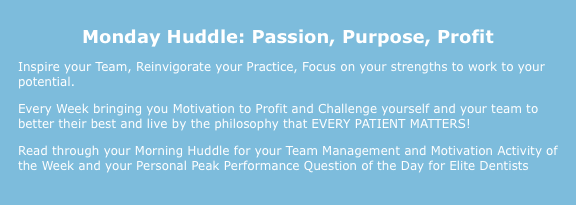I have an interesting theme for you today. It stems from one of my greatest annoyances. I am quite particular and preferential about many things in life. Still, I really don’t let much annoy me because it’s a waste of time and energy. I like to live in my own little bubble void of any of the things that I don’t want. Which, by the way, I highly recommend. Design your world the way you want it to be.
That is exactly what we are doing with your practice; as if that wasn’t obvious. Each time we show up here together, you are supposed to be going to work on what you want and focusing on things going your way with your patients, your family, yourself.
I could hit you with a whole bunch of clichés right now, all of which I have shared with you before…
You get more of what you focus on.
Life is a boomerang, what you send out is coming back.
Your world is a reflection of how you feel about yourself.
All in all, what I’m talking about is what I call “state of ideal” and it is my complete and absolute belief that five things should be true:
1st – you should know what it is for each area of your life
2nd – you should set yourself up for success to achieve it as often as possible
3rd – you should avoid and eliminate as many of the variables as you can
4th – when you can’t avoid or eliminate, you should control and mitigate
5th – and when you can’t do that, you should make as few exceptions as possible (but deal with them and then snap back like a rubber band)
Again, all of this is based first on the #1 item. You have to know what your state of ideal is.
I will give you a dental example… If we have a preferred time to schedule a new patient for one of your amazing patient experiences because it’s the best time for you – let’s do it. It will lead to the best chance at a complete case acceptance, building a long-term patient relationship and create a great impression on the patient.
That is our state of ideal. You should also have a “state of ideal” experience in and of itself.
We then know, while on the phone, how to direct the patient to that spot in the schedule and we know how to control all the rest of the time around it.
Then if the patient gives us any pushback we share with them why that is the case and see if they are able and willing to do it.
If they don’t, then we make an exception but we only make that exception by controlling all the variables around it so that giving the patient the preferred time doesn’t impact negatively either that patient or everything else in the schedule around it.
If there is no other choice (there is always the choice to do nothing), then we can make other adjustments that are of lesser value to the new patient opportunity.
Now, if it happens once, the goal would be that’s the only time it happens, then back to state of ideal and handling every new patient in your most preferred way. Rinse and repeat as needed.
But never fall victim to reverting back to being at the mercy of your patients OR, worse than that, making every single decision and action an exception just by default because it’s too difficult to stay at the state of ideal.
A life example would be more fun and maybe I will go there next week.
I could give you an endless list of dental examples where you are in a trap of repeating the same things that you’d prefer to be different just because you’ve fallen into a rut or a literal cycle of actions. You need to snap back out of them and be reminded of your desired “state of ideal.”
Maybe it hasn’t been well defined.
Maybe someone is new and doesn’t know.
Maybe it’s too difficult to do.
Maybe it has changed.
It doesn’t matter what the reason (excuse) is. It only matters that we get back to focusing on state of ideal.
In every practice there are far too many exceptions being made – that disrupt what we know are the best ways of doing things and lead to the greatest positive results.
Let’s agree to expect things to go your way for a change. That means you never settle for something less than what you have pre-determined to be the best way to win and be successful with your patients. And then, when necessary, make an exception; but don’t live, practice, decide and act as if it’s the rule.
Use the five steps as your guide. Share with each other from your perspective anything you need to reset or redefine your state of ideal. Have a plan to make that your reality far more often than not.
You do, after all, get what you accept – and that begins by what you expect.



